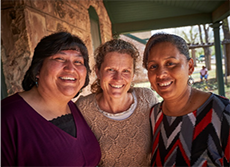
Spotlight: Johns Hopkins Center for American Indian Health |
 |
Left to right: JHCAIH staff members Francene Larzelere, MS (White Mountain Apache); Allison Barlow, PhD, MPH, MA; and Novalene Goklish, MS (White Mountain Apache)
|
For the past 30 years, the Johns Hopkins Center for American Indian Health (JHCAIH) has partnered with Native communities to address serious health disparities.
Headquartered in Baltimore, MD, the Center uses home-visiting programs to help prevent obesity and diabetes among American Indian children and adolescents. The programs tap into participants’ strengths and promote protective factors, such as cultural identity and family connections.
"We’re really holistic," says Allison Barlow, PhD, MPH, MA, Director of JHCAIH. “Rather than focusing narrowly on diet and exercise, we prevent diabetes by teaching problem-solving and coping skills and providing social support.”
Notably, JHCAIH’s programs are all implemented by Native family health coaches or facilitators.
|
"We have an amazing team of people who work hard to ensure program sustainability."
— Allison Barlow, Director, JHCAIH |
Recently, on the Center’s behalf, Barlow accepted the 2019 Native American Child Health Advocacy Award from the American Academy of Pediatrics.
The award primarily recognizes her team’s efforts to develop, evaluate, and scale up the Family Spirit program, an early childhood home-visiting program focused on promoting parents’ and children’s psychosocial and behavioral health. It has scaled to over 125 tribal communities across 20 states. Its latest iteration, Family Spirit Nurture, is aimed at preventing early childhood obesity.
"To promote the best possible diet for infants and toddlers, Family Spirit Nurture trains parents to understand their children’s cues,” explains Barlow. “Typically, a parent may feed a baby who is fussing to try to calm him or her down, but often, fussy babies are tired, uncomfortable, or sick, rather than hungry."
Although JHCAIH is well-known for its work with Navajo and White Mountain Apache communities in the Southwest, its programs encompass other regions, as well. “The exciting news is that we just opened our Great Lakes hub in Duluth, MN,” Barlow says.
That hub, directed by Melissa Walls, PhD (Bois Forte and Couchiching First Nation Anishinaabe), will enhance JHCAIH’s ongoing efforts. For example, their newest program will address stress as a mediator of obesity and diabetes in Ojibwe communities across the Upper Midwest.
|































No hay comentarios:
Publicar un comentario